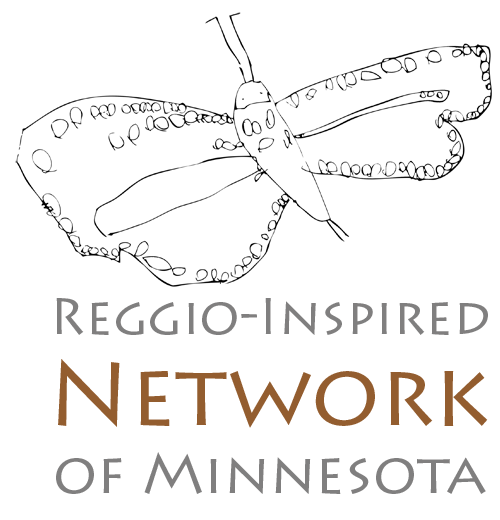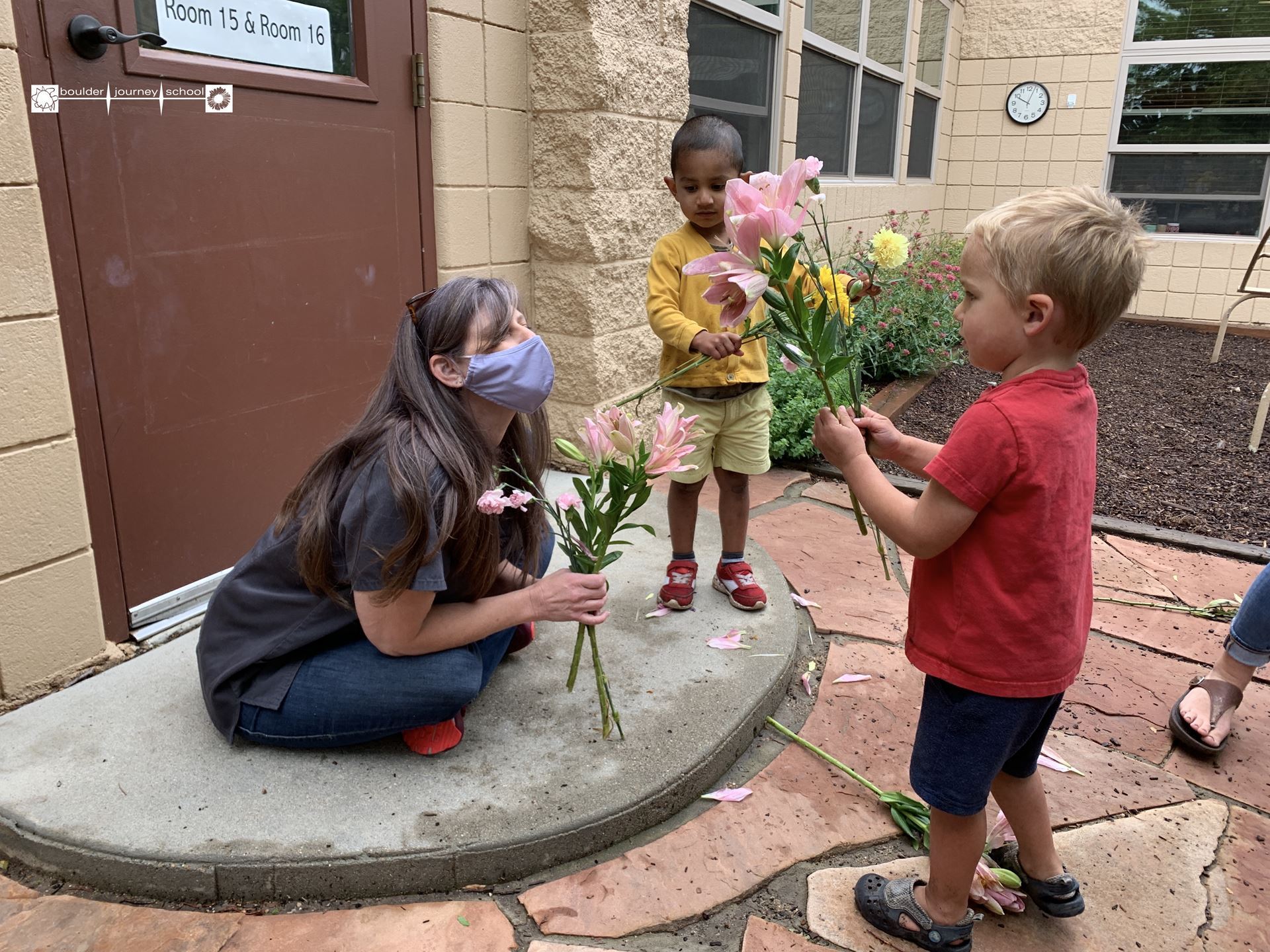Q: How might I be involved?One way is to attend a monthly gathering. Gatherings are open to all and frequently contain a mixture of regular attendees and first time visitors. Participants have included all of the following: educators interested in project-based, inquiry and service learning along with those interested in constructivist, progressive and gifted education. Also involved are folks from Montessori, arts and special education along with parents and school administrators.
Monthly gatherings are held in a variety of venues: preschools, family child care homes, kindergartens, child care center, university lab school or arts organizations and allow the first hour for studying the environment, photo/note taking and informal discussion. There is usually a theme or discussion facilitated by the host organization and time for participants to present individual work. Someone might bring photos they have taken and ask for comments from the group about where to go next with a particular learning theme. People often describe that they leave inspired and energized by the sharing of ideas and possibilities.
The topics planned emanate (in constructivist fashion) from the interests and needs of the members. We may meet to explore a particular media (like clay or dance), to build familiarity with methods of documentation, to discuss work that participants are doing with children, involving nature, civic participation, inter-generational programming, and/or special education.
Another way to become involved is to join an existing Book Study Group or start one of your own.
Go to the Events page for information about current monthly gatherings and Book Study Group.
Q: How can I become a member?While we do not have a membership yet, you can sign up for our quarterly e-mail newsletter on our Contact page. If you register for an Event, this website will automatically create and e-mail you an account with a password.
Q: Is there such a thing as a Reggio school and how do I find a Reggio-inspired school in or near Minnesota?The only true Reggio Emilia schools are located in Reggio Emilia, Italy. Many educators around the world are inspired by the principles of the schools in Italy and seek to work with children in compatible ways. Some schools in the U.S. describe themselves as “Reggio-inspired,” more typically, some educators within a school begin to adapt their teaching as they study the ideas of this international movement.
There are just a few schools in the Minnesota area whose programs are significantly based on the Reggio Emilia framework. We do not make school recommendations. However, there are many individual classroom teachers who are inspired by this approach. As you visit schools and speak with teachers and administrators, you may look for schools who:
- respect children as strong competent learners
- develop curriculum around children’s interests and passions
- spend time carefully observing and documenting what children do
- consciously work to create a culture of community with parents and children
- probe topics for lengthy periods of time
- seek to understand and document the children’s learning through a variety of methods
Q: What would a day in a Reggio-inspired school look like?A day in a Reggio-inspired school would have many of the same core elements shared by preschool programs of other philosophies. Families and children are greeted, welcomed into the school and encouraged to choose from a variety of activities. The schools in Reggio Emilia work very hard to create a strong connection between the family and the school and therefore schools inspired by this approach place a high value on intentionally creating spaces and rituals which nurture this crucial relationship.
The daily schedule will contain a balance of child directed work time and full group meetings where songs are sung and books are read. Snack is served, children play outside and/or in a large muscle room.
Some of the subtle differences are apparent upon closer look. Children may spend a portion of their day in “small group work” where they explore a particular topic in depth for several weeks or even the entire year. The focus is on encouraging the sort of questioning, dialogue and investigation work typically not experienced at this age. Teachers guide the children as “co-investigators”, recording the children’s observations, documenting the children’s work and guiding the discussion to allow in-depth thinking around a topic. Children may explore different aspects of the topic by using any one of the “hundred languages” described by Loris Malaguzzi, founder of the Reggio Emilia schools. These may include drawing, dance, story telling, scientific observation, collage, clay, etc.
As you hear the teacher work with the children, you may notice that s/he thoughtfully supports the children’s questioning and discussion. Current brain research shows that the capacity to think and create understanding is strongly encouraged by creating the capacity to discuss issues back and forth between differing viewpoints, constantly refining one’s understanding of a particular topic. As a result, another difference is that some of the “children’s work” stays at the school, to be revisited and refined at a later time.
Most Reggio-inspired educators value large periods of unstructured time for children to engage in meaningful work, as such the schedule of the day will probably feature at least one large period of time in the morning (and afternoon when applicable) when the work of the day can take place. Just as adults don’t find it easy to engage in deep, productive work during a scattered day with many changes, children are more likely to go beyond surface thinking and surface play when there is ample time.
Q: Whose ideas inform this work?Educators in Reggio Emilia cite a variety of educators and philosophers who inspired their work, including Jean Piaget, Lev Vygotsky, Jerome Bruner, John Dewey, Howard Gardner, Paulo Freire, Maria Montessori, etc. Some of the people inspired by Reggio Emilia are also studying and reading (and participating in) progressive education, arts education, arts organizations, civic participation, public and private schools, home schooling and child care providers.
Q: How can I learn more?Explore this website for further information, starting with the Introduction to Reggio-Emilia approach. See our Professional Development/Learn More page for an Essential Readings list of publications which will provide more information about the Reggio approach.
Q: How might I begin this work in my setting?The study of this work plays out in a kind-of spiral of experiences and understandings, going deeper and encountering ideas in new and enriched contexts. For example, if working on your environment seems like an entry point for you, then making thoughtful and intentional changes might be your beginning. Others have made changes in their attitudes about relationships with families, working on ways to honor the connection between home and school. Studying the theory and practices of Reggio Emilia by reading articles and books is a common starting place for many.
Observing and documenting might be an entry point for others. Because this approach is not linear or sequential nor a curriculum or “recipe”, all the different aspects interact with and affect each other. Studying one aspect will inevitably lead you to think of other tenets in relation to the first.
Q: What about standards and readiness?Current educational discussion focuses on standards and testing where objectives and goals are pre-established for learners. Teachers are trained to work in such a way as to achieve those goals, teach skills to children using pre-determined lessons and assess by testing. The children learning and living in a Reggio-inspired context explore theories supported by teachers and families and continually grow in their development, abilities, interests and curiosities. Relationships and collaborative learning are the basis of the school. In this Reggio-inspired practice, a rich environment is designed for exploration. Connections that lead to new knowledge are achieved in a natural, organic manner. Teachers listen and document the work of children as they pursue their learning. They then analyze the work and exchange interpretations to support and extend the work.
When we examine the documentation that derives from Reggio-inspired, project-based practice and compare it to age or grade standards, it becomes evident that the children have far exceeded the standards and achieved deeper, higher learning skills than are laid out in the curriculum.
Q: Can Reggio-inspired work be done at home?Yes! In fact, some might say that the home is an excellent place to think and work in this way. It has built-in small groups that are embracing and honoring daily life in a very authentic way. There are close relationships with families in this small and intimate setting. The flow of the day would be natural and organic because of the absence of the dictates of a large setting.
Q: Whom might I contact to ask questions?Email reggioinspiredmn@gmail.com
|

